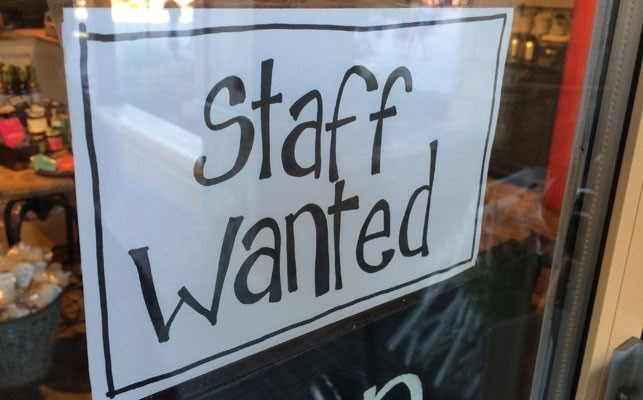I’ve written before in the pages of Pique about the eclectic collection of employment experiences I dabbled in before landing in journalism.
My first job was sweeping floors and washing semi trucks for an irate rich man on the verge of a heart attack; my second unloading them in the warehouse of the local Walmart.
I spent a year pounding nails for an old hippie, as he and I and one other employee built a house from the ground up; a summer clearing brush in the remote Saskatchewan wilderness.
I laid flooring, delivered furniture, inventoried warehouses, and got severe heat stroke rolling turf on a sod farm; I got fired from a night job driving a forklift at a Coca-Cola bottling plant when I skipped work to go to the lake.
I spent two years on the pipeline in Alberta, first as a labourer then as a heavy equipment operator—the only job I ever had that wasn’t woefully underpaid.
While I didn’t despise all of these jobs, they all had one thing in common: they were never anything more than jobs—a place I went for a set amount of hours every day out of necessity, always counting down the minutes until I could be free to do something I enjoyed.
I lived through my fair share of minor, existential, “is-this-all-there-is” crises before I eventually found my true calling. But I never forgot that feeling.
It’s a shared disillusionment that sits at the heart of a rapidly growing labour movement in North America—one where workers push back against exploitation and stagnant wages, and quit their jobs in droves.
Helping fuel the movement is Reddit’s r/antiwork community, which has witnessed explosive growth in recent months, and now boasts 1.7 million members (up from about 200,000 in January 2021).
While there are of course conflicting ideologies about what exactly “antiwork” means, moderators of the community have stated it is not about laziness, but opposing a system that benefits a small minority rather than the workers who make society function.
“We’re not against effort, labour, or being productive,” reads a post in the group’s FAQ. “We’re against jobs as they are structured under capitalism and the state: Against exploitative economic relations, against hierarchical social relations at the workplace.”
The COVID-19 pandemic may have accelerated them, but they’re not exactly new ideas—and historically, similar society-shifting events have also pushed workers to act.
In the wake of the First World War and the 1918 influenza pandemic (or Spanish flu), French workers leveraged a labour shortage into a shorter workday and higher wages.
“In a concentrated period between 1917 and 1920, French citizens ignited a protest movement in which millions of workers across sectors participated in organized and wildcat strikes, sabotage actions, walkouts, slowdowns and absenteeism,” writes art historian Abigail Susik in an essay for the Washington Post.
“As a result, the French labour force soon succeeded in winning a major demand: the enactment of the eight-hour workday by Prime Minister Georges Clemenceau in 1919.”
That marked a big win for the movement—led by a group of young veterans calling themselves “Surrealists”—but the fight for fairness continued, and things like significant wage increases, the 40-hour workweek and paid holidays wouldn’t be signed into French law until 1936.
The United States established its own 40-hour week in 1938, but the practice didn’t become commonplace in Canada until the early 1960s.
Two years into our own pandemic, it seems another shift is underway. Corporations have posted record profits while wages remain stagnant. Frontline workers have faced unsafe conditions and burnout while serving ungrateful, at-times-abusive customers. To top it all off, inflation is out of control, and an entire generation now sees homeownership as a distant dream.
Many have had enough.
In Whistler, which has always had its own struggles finding enough workers to staff the resort, the disillusionment is as real as anywhere else.
When Pique reached out to local workers for a story taking the temperature of the workforce in June 2021, many shared thoughts in line with today’s antiwork movement—that self-care and self-actualization were more important than empty wage slaving.
The broader shift in the mindset of the labour pool should bode well for workers, but for business in Whistler? Not so much. At least not in the short term.
An October study by the Canadian Centre for Policy Alternatives found that more than 180,000 Canadian workers left the restaurant sector during the pandemic—and most aren’t coming back.
Many employers in Whistler understand the importance of paying good wages, offering useful benefits and attractive perks, and fostering a supportive culture.
But with the mass exodus that has already occurred, and the surging labour resistance now underway, will that matter?
You can tout your attractive wages and the appeal of the mountain-resort lifestyle of Whistler all you want, but if the workers aren’t there (and if there’s nowhere for them to live comfortably and affordably—as is the case in Whistler right now), you’re going to be understaffed.
Local businesses have countered the shortage with compromise: reduced hours, scaled-back menu offerings, and even full-on closures.
The short-term answer for Whistler as a whole may be similar: to live within more modest means, accept our limitations, at least for now, and be satisfied operating inside of them.
That may amount to economic sacrilege to some, but if recent trends are any indication, it might not be our choice to make.






